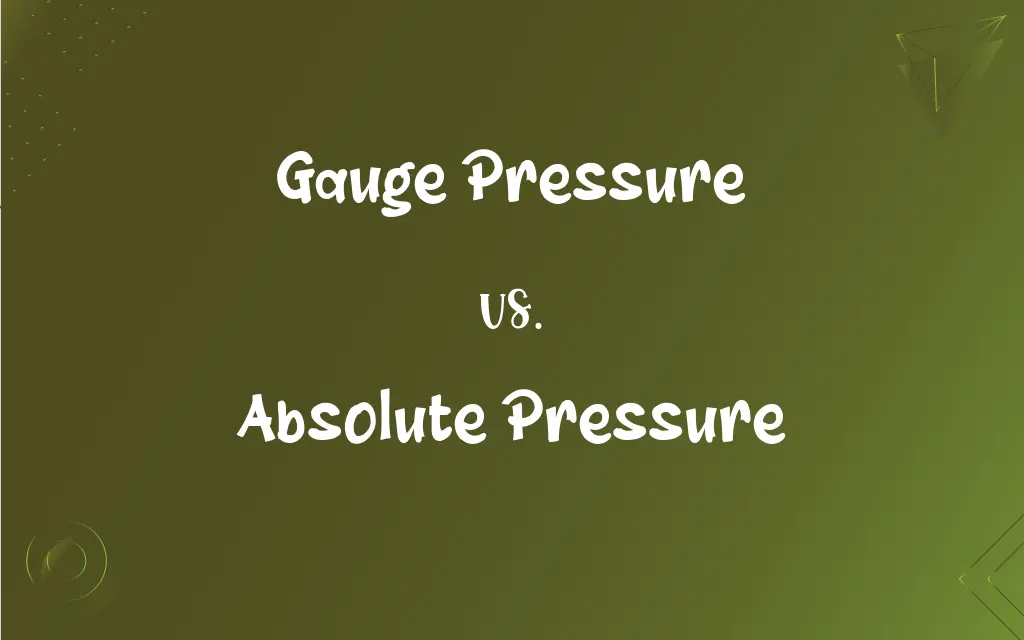Gauge Pressure vs. Absolute Pressure: What's the Difference?
Edited by Harlon Moss || By Janet White || Published on December 11, 2023
Gauge pressure measures pressure relative to atmospheric pressure, while absolute pressure includes atmospheric pressure in its measurement.

Key Differences
Gauge pressure is the pressure relative to atmospheric pressure. It is commonly used in everyday applications like tire pressure. Absolute pressure, on the other hand, measures pressure relative to a complete vacuum, providing a more comprehensive reading.
In measuring gauge pressure, the reference point is the local atmospheric pressure, which is considered zero. Absolute pressure uses a vacuum as its reference, where zero absolute pressure means no pressure at all.
Gauge pressure can be negative or positive, indicating whether the measured pressure is below or above atmospheric pressure. Absolute pressure, however, is always positive since it includes the atmospheric pressure and the pressure of the measured system.
When calculating gauge pressure, atmospheric changes can affect the readings, making it less stable in varying environmental conditions. Absolute pressure is unaffected by atmospheric changes, providing a stable reference.
Gauge pressure is practical for applications where only the difference from atmospheric pressure matters. Absolute pressure is crucial in scientific research and in systems where vacuum conditions need to be precisely measured.
ADVERTISEMENT
Comparison Chart
Reference Point
Atmospheric pressure
Absolute vacuum
Measurement Range
Can be negative or positive
Always positive
Environmental Influence
Affected by atmospheric changes
Unaffected by atmospheric changes
Practical Use
Common in everyday applications
Essential in scientific and vacuum systems
Zero Point Significance
Zero indicates atmospheric pressure
Zero indicates a complete vacuum
ADVERTISEMENT
Gauge Pressure and Absolute Pressure Definitions
Gauge Pressure
Gauge pressure is the pressure relative to atmospheric pressure.
The gauge pressure of a car tire is usually around 32 psi.
Absolute Pressure
Absolute pressure is always a positive value and starts from zero in a perfect vacuum.
In a vacuum chamber, the absolute pressure approaches zero.
Gauge Pressure
It represents the difference between absolute pressure and atmospheric pressure.
A gauge pressure of -5 psi indicates a vacuum compared to the local atmospheric pressure.
Absolute Pressure
Absolute pressure is crucial in scientific measurements and calculations.
Researchers use absolute pressure to calculate gas laws in controlled environments.
Gauge Pressure
Gauge pressure is used in systems where atmospheric pressure impacts performance.
The gauge pressure in a water tank helps determine water flow rate.
Absolute Pressure
Absolute pressure is the total pressure measured from a vacuum.
At sea level, the absolute pressure is the sum of the gauge pressure and atmospheric pressure.
Gauge Pressure
Gauge pressure can indicate either a pressure surplus or deficit relative to atmospheric pressure.
A negative gauge pressure reading often signifies a partial vacuum in the system.
Absolute Pressure
It considers the atmospheric pressure as part of the total pressure reading.
Absolute pressure in a sealed container includes both the internal pressure and atmospheric pressure.
Gauge Pressure
It is a practical measure for everyday pressure-related applications.
Mechanics check the gauge pressure of engines to ensure proper functioning.
Absolute Pressure
It is a more comprehensive pressure measurement compared to gauge pressure.
In space, absolute pressure measurements are vital due to the lack of atmospheric pressure.
FAQs
Can gauge pressure be negative?
Yes, gauge pressure can be negative if the measured pressure is below atmospheric pressure.
How is gauge pressure different from absolute pressure?
Gauge pressure excludes atmospheric pressure from its measurement, while absolute pressure includes it.
Is absolute pressure ever negative?
No, absolute pressure is always positive since it measures from a vacuum baseline.
Why is gauge pressure used in car tires?
Gauge pressure is practical for everyday applications like car tires, where only the difference from atmospheric pressure is relevant.
What is absolute pressure?
Absolute pressure is the total pressure measured against a perfect vacuum.
Why can't gauge pressure be used for scientific experiments?
Gauge pressure can vary with atmospheric conditions, making it less reliable for precise scientific experiments.
What is gauge pressure?
Gauge pressure is the pressure measured relative to the local atmospheric pressure.
What instruments measure gauge pressure?
Manometers, Bourdon gauges, and tire pressure gauges measure gauge pressure.
How do changes in atmospheric pressure affect gauge pressure?
Changes in atmospheric pressure can alter gauge pressure readings, as it's relative to atmospheric conditions.
How is absolute pressure calculated?
Absolute pressure is calculated by adding atmospheric pressure to the gauge pressure.
Can absolute pressure be used to measure vacuum strength?
Yes, absolute pressure measurements are used to determine the strength of a vacuum.
Is gauge pressure used in aviation?
Yes, gauge pressure is used in aviation for various measurements, but corrected for altitude variations.
Does absolute pressure change with altitude?
Yes, absolute pressure changes with altitude due to the variation in atmospheric pressure.
Is gauge pressure relevant in space?
No, gauge pressure is not relevant in space due to the absence of atmospheric pressure.
In what scenarios is absolute pressure essential?
Absolute pressure is essential in scientific research and applications involving vacuums.
What instruments measure absolute pressure?
Barometers and absolute pressure sensors are used for measuring absolute pressure.
What is a typical absolute pressure at sea level?
At sea level, the typical absolute pressure is around 101.3 kPa or 14.7 psi.
Can gauge pressure readings be converted to absolute pressure?
Yes, by adding the atmospheric pressure to the gauge pressure reading.
How does weather affect gauge pressure readings?
Weather changes can affect atmospheric pressure, thereby influencing gauge pressure readings.
Why is absolute pressure important in underwater exploration?
Absolute pressure is crucial in underwater exploration to measure the total pressure exerted by water and the atmosphere.
About Author
Written by
Janet WhiteJanet White has been an esteemed writer and blogger for Difference Wiki. Holding a Master's degree in Science and Medical Journalism from the prestigious Boston University, she has consistently demonstrated her expertise and passion for her field. When she's not immersed in her work, Janet relishes her time exercising, delving into a good book, and cherishing moments with friends and family.
Edited by
Harlon MossHarlon is a seasoned quality moderator and accomplished content writer for Difference Wiki. An alumnus of the prestigious University of California, he earned his degree in Computer Science. Leveraging his academic background, Harlon brings a meticulous and informed perspective to his work, ensuring content accuracy and excellence.
































































